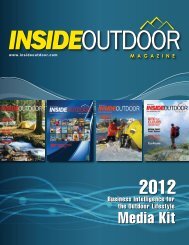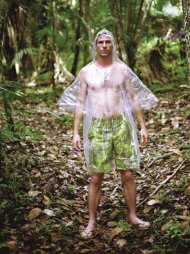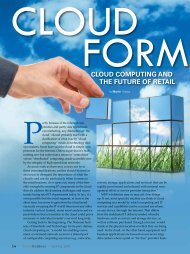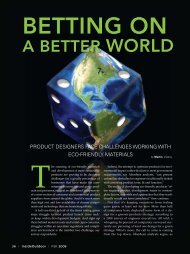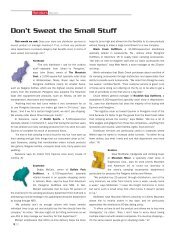Fall - InsideOutdoor Magazine
Fall - InsideOutdoor Magazine
Fall - InsideOutdoor Magazine
You also want an ePaper? Increase the reach of your titles
YUMPU automatically turns print PDFs into web optimized ePapers that Google loves.
Top Five Challenges for Developing Green Products<br />
Challenge<br />
High expense associated with developing new technologies that are green or<br />
compliant<br />
43%<br />
Regulations differ widely according to regions and countries around the world 30%<br />
Difficulty measuring unconventional ROI on green products 25%<br />
Difficulty in understanding applicable regulations due to exemptions and<br />
shortages of knowledgeable employees<br />
24%<br />
Greener materials and technologies require new and large capital<br />
manufacturing investments<br />
24%<br />
Source: Aberdeen Group<br />
% of All Respondents<br />
DEALERS WANTED<br />
Top Five Pressures Driving Green Product Development<br />
Pressure<br />
Developing green products part of corporate social responsibility initiative 37%<br />
Green products offer greater competitive product differentiation 35%<br />
Conscientious customers demand products that are more eco-friendly 28%<br />
Compliance to green related regulations required for market entry 26%<br />
Customers demand for products that use natural resources more efficiently 23%<br />
Source: Aberdeen Group<br />
% of All Respondents<br />
‘going green’ in their everyday life is simply<br />
not a big concern or a high priority,”<br />
says Smith.<br />
A mere 13 percent of those surveyed<br />
by Yankelovich, says Smith, are “strongly<br />
concerned” about the environment, while<br />
less than a quarter believe they can make<br />
a difference.<br />
And while Al Gore’s An Inconvenient<br />
Truth received widespread acclaim from<br />
the media and members of the scientific<br />
community, less than 20 percent of consumers<br />
saw the movie or read the book,<br />
say Yankelovich findings.<br />
Some may argue that the current economic<br />
crisis is distracting consumers from<br />
just about every other issue under the sun,<br />
including the environment. But no matter<br />
the reasons, such results already are raising<br />
questions about the potential bottomline<br />
benefits that can be derived from<br />
investing in socially responsible product<br />
development. Unless consumers begin to<br />
change their tune, one has to wonder how<br />
much patience American manufactures<br />
will show toward green investments outside<br />
of regulatory-driven necessities.<br />
Not that all hope is lost, by any means.<br />
In its sixth annual report on the carbon<br />
footprints of Global 500 companies, the<br />
Carbon Disclosure Project, a not-for-profit<br />
organization that acts as an intermediary<br />
between shareholders and corporations on<br />
climate change-related issues, argues that<br />
some companies confirmed billions of dollars<br />
in savings as a result of sustainability<br />
efforts in operations and packaging.<br />
Even within the seemingly pessimistic<br />
Yankelovich study, Smith makes the point<br />
that despite “most consumers’ lukewarm<br />
attitudes toward green,” companies that<br />
successfully convey the benefits of green<br />
attributes in a product can make those attributes<br />
a key feature in the buying decision<br />
of consumers who are just moderately<br />
concerned about climate change and the<br />
environment. That could include all but<br />
the 29 percent of consumers described by<br />
Yankelovich as “Greenless,” or unmoved<br />
by environmental issues and alarms.<br />
Possibly most encouraging of all, Aberdeen<br />
researchers found a direct correlation<br />
between the length of time a company<br />
has been pursuing a green strategy and<br />
the level of success in generating a positive<br />
return from it. So companies that have<br />
had the opportunity to figure out what<br />
does and does not work well earlier than<br />
their manufacturer peers are dramatically<br />
more likely to hit launch dates, stick within<br />
budgets and minimize price increases.<br />
That seems to suggest that if manufacturers<br />
continue to push on, the premium<br />
price paid for greener products eventually<br />
goes away. And at that point, the need<br />
to change consumer behavior becomes<br />
much less of a factor.<br />
In the long term, eco-friendly product<br />
development could have a bright future.<br />
But that’s assuming manufacturers of all<br />
types can be persuaded to show patience,<br />
seeing how, in the nearer term, as we<br />
have said before, things likely get harder<br />
before they get easier.<br />
• Mulit-funtional gloves featuring •<br />
Thermolite ® Fibers<br />
• Keep you warm, even when wet •<br />
• Excellent P.O.P. display options •<br />
• MORE PROFIT PER PEG •<br />
Free<br />
sample pair for<br />
qualified dealers. Call us for<br />
more information<br />
800-426-8860<br />
atlasgloveconsumerproducts.com<br />
GO ANYWHERE • DO ANYTHING<br />
ATLAS® is a registered trademark of<br />
SHOWA Glove Co. Thermolite® is a registered<br />
trademark for INVISTA certified performance<br />
fabrics containing proprietary INVISTA fibers.<br />
<strong>Fall</strong> 2008 | <strong>InsideOutdoor</strong> | 39




